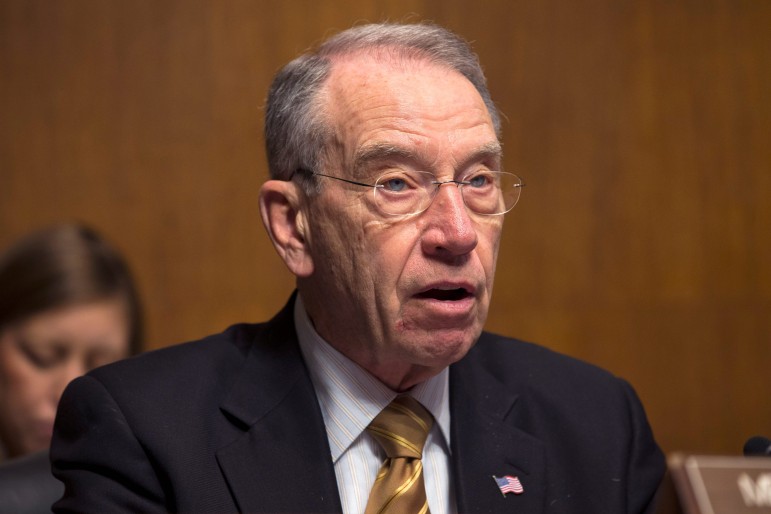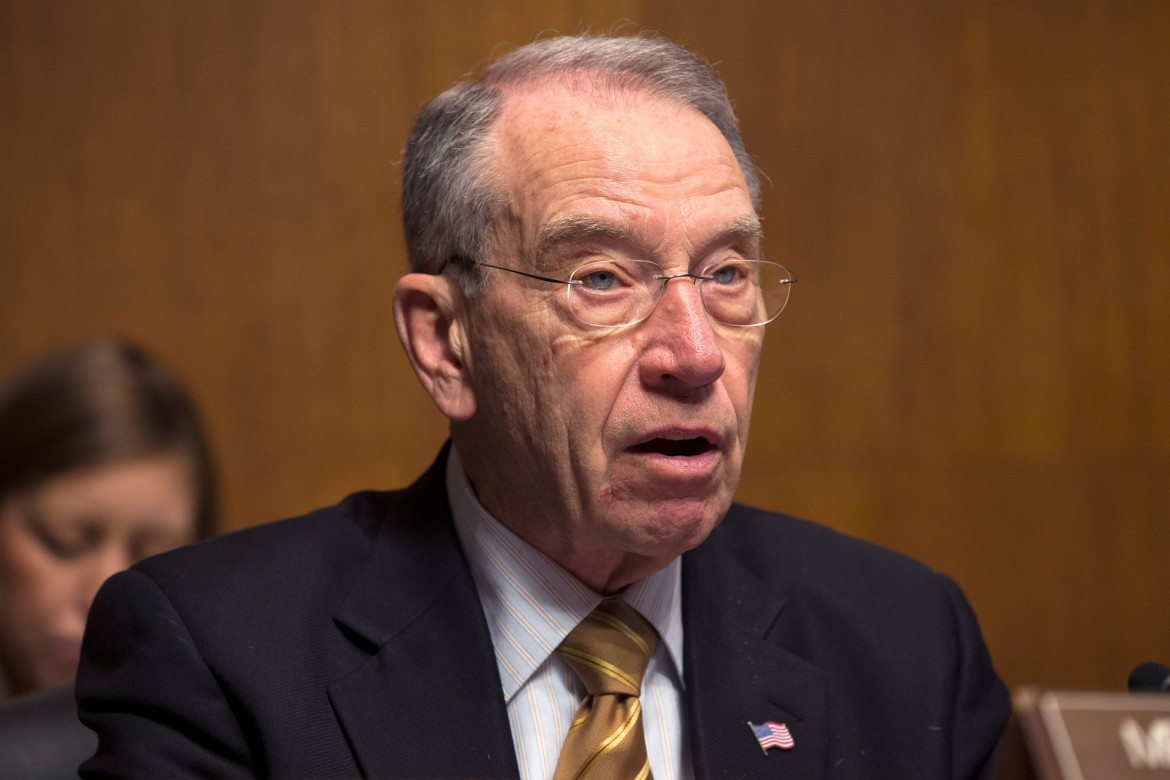
Jacquelyn Martin / AP Photo
Sen. Chuck Grassley, R-Iowa.
WASHINGTON — Whistleblowers’ allegations that millions of dollars in federal juvenile justice grants went to states that jailed vulnerable youths with adults in violation of federal law will be scrutinized at a congressional hearing Tuesday.
The U.S. Senate Judiciary Committee’s oversight hearing will focus on a monthslong inquiry led by committee chairman Sen. Charles E. Grassley, R-Iowa.
At least three whistleblowers — two of them employees of the federal Office of Juvenile Justice and Delinquency Prevention (OJJDP) and a law school professor — are expected to testify, according to sources very close to the investigation who did not want to be identified because they feared retaliation. The OJJDP employees have been identified as Elissa Rumsey and Andrea Coleman, both compliance monitoring coordinators who investigate whether states meet federal requirements under the Juvenile Justice and Delinquency Prevention Act, the main federal juvenile justice law.
Coleman, sources said, will dispute claims of people who back OJJDP Administrator Robert Listenbee that Grassley is dredging up old allegations that predated his tenure, which began in March 2013.
“She’ll say this isn’t old news,” one source said. “This is all the way up to and including today. ... She’s giving examples about how she’s tried to hold states out of compliance and no one [in OJJDP] allowed her to do it.”
In retaliation for her whistleblowing, Coleman, who also oversaw states’ compliance with other “core requirements” of the 1974 JJDPA, lost her role as compliance monitoring for disproportionate minority contact (DMC), though she retains her title, sources said.
In a seven-page Feb. 27 letter to Karol Mason, the assistant attorney general for the Office of Justice Programs, Grassley outlined allegations by whistleblowers that oversight failures may have led to unlawful OJJDP grants to Alabama, Idaho, Illinois, Puerto Rico, Rhode Island, Tennessee, Virginia and Washington, D.C.
That came after a January letter in which the Judiciary Committee chairman ordered Mason to respond to whistleblowers’ claims OJJDP had knowingly violated federal law by giving millions of dollars in grant money to Wisconsin and four other states or territories that jailed runaway youth, foster children and other “vulnerable minors” in violation of the JJDPA.
The law contains four core requirements states and territories must comply with to earn OJJDP grant money: “deinstitutionalization” of status offenders, those who commit acts that are offenses only because of their status as juveniles, such as skipping school or possession of alcohol; addressing DMC within the juvenile justice system through detailed plans aimed at reducing it; removal of juveniles from adult jails within prescribed time limits; and separation of juveniles from adult inmates when the juveniles are in adult facilities.
Whistleblowers said at least two states, Illinois and Rhode Island, improperly received full grant funding despite failing to comply with the DMC requirement, according to Grassley’s office.
Coleman is expected to testify that she was ordered by Listenbee and others at OJJDP not to investigate failure to comply with the DMC requirement in any state, sources said.
Also expected to testify is Dean Hill Rivkin, a Knox County, Tenn., law school professor who operates a clinic that represents status offenders. In 2012 alone, more than 26,000 petitions for “status/unruly offenses” were filed in Tennessee, more than 9,600 of them for truancy, Rivkin said in a Nov. 6, 2013, letter to Listenbee. His clinic had taken documentation of these detentions to the Tennessee Commission on Children and Youth, which the clinic concluded did not understand its monitoring responsibilities, Rivkin wrote. The clinic, the Education Law Practicum, then turned to OJJDP.
“OJJDP was unwilling to receive documentation of these alleged violations” by Rivkin, Grassley wrote in the Feb. 27 letter to Mason. More than a year after he wrote to Listenbee, Rivkin received a reply: a Feb. 28, 2014, letter from Listenbee saying “all of the facilities visited and participating agencies were reported to be fully compliant” with an OJJDP audit.
Listenbee suggested Rivkin file a Freedom of Information Act request if he wanted to see the full compliance monitoring audit.
Tom Devine, an attorney with the watchdog Washington-based Government Accountability Project, who represents whistleblower Jill Semmerling, also said he would attend Tuesday’s hearing. Semmerling, a former criminal investigator for the Department of Justice’s Office of Inspector General, alleged that in 2008 Wisconsin had failed to separate vulnerable children from adults in detention facilities but has continued receiving federal grants based on claiming compliance.
Starr Stepp, a Justice Department spokeswoman, confirmed in an email that Mason, the boss of Listenbee, also will testify.
Stepp declined to comment on specific questions about the inquiry, including whistleblowers’ claims of fraud and mismanagement in the continuing awarding of OJJDP grants to nine states and territories.
Whistleblowers who made the allegations faced retribution, Grassley has said in correspondence.
That included being reassigned, in two cases from OJJDP to the Bureau of Prisons; losing key job functions; and being stripped of the right to telecommute part of their workweek, he wrote.
In response to the Grassley probe, juvenile justice advocates have lined up in support of Listenbee, characterizing the widening investigation as a witch hunt.
Some blamed disgruntled longtime employees who resisted change and tough leadership in an agency that had lacked a permanent administrator for six years. Some cited a lack of funding to enable the administrator to effectively carry out OJJDP’s compliance with core requirements of the JJDPA. Some said Listenbee had no control or oversight during some of the alleged violations. Others said the White House had hand-picked top Listenbee aides, leading to friction and difficulty carrying out the agency’s mission.
Taylor Foy, a spokesman for Grassley, said none of these factors motivated the senator’s investigation.
“We’ve had whistleblowers talk about flaws in the grant program, and Chairman Grassley committed to providing the oversight that the programs function the way they were intended to function and that taxpayer dollars are being used appropriately and that the people who are supposed to be served by these programs are being adequately served,” Foy said.
“So oversight’s an important role of Congress and that’s what this hearing’s about. So it’s not directed at any one person. It’s to get at what we’ve been told is a problem in some states and to figure out what a problem it is and how it can be resolved.”
Foy noted Grassley has long supported whistleblowers and is chairman and a founding member of the Senate Whistleblower Protection Caucus.
In addition to the states and territories named in the inquiry so far, Grassley’s office has said in a news release, “The alleged mismanagement may extend to many more states and could date as far back as 1986.”
His office asserts the states continued receiving millions of dollars in federal grant money despite violations of JJDPA provisions.
Under the JJDPA, OJJDP is required to reduce a state’s JJDPA grant funding for a given year by 20 percent for each core requirement violated in the previous fiscal year. A state is to receive no JJDPA funds for the year following a violation unless it meets one of two criteria, which include showing “subsequent, substantial compliance with the requirement(s) it was violating.”
Grassley’s office said he plans to offer reforms to the OJJDP grant program in a JJDPA reauthorization bill in response to the whistleblowers’ allegations. He and Sen. Sheldon Whitehouse, D-R.I., had introduced a bipartisan bill in December to reauthorize the JJDPA.
The main federal juvenile justice law has not been reauthorized since 2002 and has not undergone major changes for more than two decades.
A new reauthorization bill is expected to call for changes to core requirements, including phasing out the exception allowing detention of status offenders; significantly strengthening a requirement to reduce racial and ethnic disparities in the juvenile justice system; reducing the number of youths placed in adult facilities; offering states incentives for relying less on incarceration; and improving education for incarcerated youths.

Pingback: Mike's Blog Round Up -